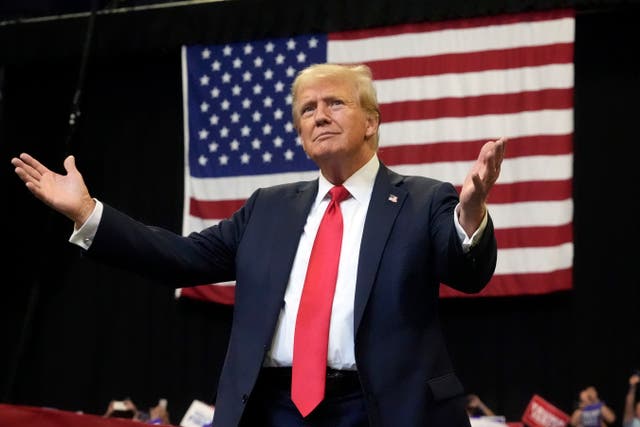
Former president Donald Trump’s presidential campaign said that it has been hacked and suggested Iranian actors were involved in stealing and distributing sensitive internal documents.
The campaign provided no specific evidence of Iran’s involvement, but Saturday’s claim comes a day after Microsoft issued a report detailing foreign agents’ attempts to interfere in the US campaign in 2024.
It cited an instance in June of an Iranian military intelligence unit sending “a spear-phishing email to a high-ranking official of a presidential campaign from a compromised email account of a former senior advisor”.

Trump campaign spokesperson Steven Cheung blamed the hack on “foreign sources hostile to the United States”.
The National Security Council did not immediately respond to a request for comment.
Politico first reported on the hack on Saturday.
The outlet reported that it began receiving emails on July 22 from an anonymous account.
The source — an AOL email account identified only as “Robert” — passed along what appeared to be a research dossier the campaign had apparently done on the Republican vice presidential nominee, Ohio Senator JD Vance.
The document was dated February 23, almost five months before Mr Trump selected Mr Vance as his running mate.
“These documents were obtained illegally” and “intended to interfere with the 2024 election and sow chaos throughout our Democratic process,” Mr Cheung said.
He pointed to the Microsoft report issued on Friday and its conclusions that “Iranian hackers broke into the account of a ‘high ranking official’ on the US presidential campaign in June 2024, which coincides with the close timing of President Trump’s selection of a vice presidential nominee”.
“The Iranians know that President Trump will stop their reign of terror just like he did in his first four years in the White House,” Mr Cheung said, adding a warning that “any media or news outlet reprinting documents or internal communications are doing the bidding of America’s enemies and doing exactly what they want”.
In response to Microsoft’s report, Iran’s United Nations mission denied it had plans to interfere or launch cyberattacks in the US presidential election.
Mr Cheung did not immediately respond to questions about the campaign’s interactions with Microsoft on the matter.
Microsoft said on Saturday it had no comment beyond its blog post and Friday report.
In that report, Microsoft stated that “foreign malign influence concerning the 2024 US election started off slowly but has steadily picked up pace over the last six months due initially to Russian operations, but more recently from Iranian activity”.
The analysis continued: “Iranian cyber-enabled influence operations have been a consistent feature of at least the last three US election cycles.
“Iran’s operations have been notable and distinguishable from Russian campaigns for appearing later in the election season and employing cyberattacks more geared toward election conduct than swaying voters.”
“Recent activity suggests the Iranian regime — along with the Kremlin — may be equally engaged in election 2024,” Microsoft concluded.
Specifically, the report detailed that in June 2024, an Iranian military intelligence unit, Mint Sandstorm, sent a phishing email to an American presidential campaign via the compromised account of a former adviser.
“The phishing email contained a fake forward with a hyperlink that directs traffic through an actor-controlled domain before redirecting to the listed domain,” the report states.
Vice President Kamala Harris’ campaign did not immediately respond to a request for comment on the reported hacking or on the Democratic nominee’s cybersecurity protocols.


Why are you making commenting on The National only available to subscribers?
We know there are thousands of National readers who want to debate, argue and go back and forth in the comments section of our stories. We’ve got the most informed readers in Scotland, asking each other the big questions about the future of our country.
Unfortunately, though, these important debates are being spoiled by a vocal minority of trolls who aren’t really interested in the issues, try to derail the conversations, register under fake names, and post vile abuse.
So that’s why we’ve decided to make the ability to comment only available to our paying subscribers. That way, all the trolls who post abuse on our website will have to pay if they want to join the debate – and risk a permanent ban from the account that they subscribe with.
The conversation will go back to what it should be about – people who care passionately about the issues, but disagree constructively on what we should do about them. Let’s get that debate started!
Callum Baird, Editor of The National
Comments: Our rules
We want our comments to be a lively and valuable part of our community - a place where readers can debate and engage with the most important local issues. The ability to comment on our stories is a privilege, not a right, however, and that privilege may be withdrawn if it is abused or misused.
Please report any comments that break our rules.
Read the rules hereLast Updated:
Report this comment Cancel